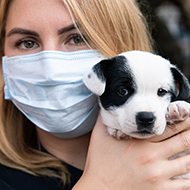Views sought on puppy purchasing

"We are interested in whether pandemic-related changes in puppy buying persisted into 2021" - Rowena Packer, RVC.
The Royal Veterinary College (RVC) is seeking views from owners who bought a puppy during 2021 to see whether pandemic-related changes in puppy buying persisted into 2021.
Data from the survey, entitled Pandemic Puppies – The Next Generation, will be compared to previous years to see if the changes in UK puppy purchasing during COVID-19 have returned to their pre-pandemic levels or whether they remain.
Following the success of the RVC’s initial study in 2020, the survey will investigate the legacy of this period and the future of UK puppy buying culture, particularly as pandemic restrictions continue to lift.
The findings will then be used to better support owners and inform the approach vets and animal welfare experts take when sharing educational messaging.
Dr Rowena Packer, a lecturer in companion animal behaviour and welfare science at the RVC, said: “The COVID-19 pandemic led to changes in the way many of us bought our household goods, with online ordering and delivery a common feature of lockdown life. The pandemic also led to changes in the way the UK bought puppies during 2020, due to the many restrictions to travel and social contact during this period.
“Many of these so-called ‘Pandemic Puppies’ became much-cherished companions, helping households cope with lockdown life; however, there are concerns that some owners were duped into buying from unscrupulous breeders. We are interested in whether pandemic-related changes in puppy buying persisted into 2021, so we can best support owners of puppies bought during this period going forward. We would love to hear from anyone who purchased a puppy during 2021 to share their experiences.”
Findings from the winter 2020 survey revealed several changes in the buying habits of some 7,500 owners. Respondents said they were more likely to buy a younger puppy, pay a deposit without seeing their puppy, be first-time dog owners with children in their household, and pay more than £2,000.
The survey also revealed that owners were more likely to see their puppy without their littermates, and would collect their puppy from outside their breeders’ property or have it delivered.



 The Veterinary Medicines Directorate (VMD) is inviting applications from veterinary students to attend a one-week extramural studies (EMS) placement in July 2026.
The Veterinary Medicines Directorate (VMD) is inviting applications from veterinary students to attend a one-week extramural studies (EMS) placement in July 2026.